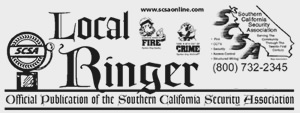 |
Reprinted from The Local Ringer
Official Publication of the
Southern California Security Association
© 2005 Glenn M. Gottlieb
All rights reserved. |
Be Mindful - Beware:
The Limitations (and Perils!) of E-Mail
Glenn M. Gottlieb
(October 2005)
There is little doubt that the wide-spread use of e-mail has ushered in a new age of effective communication. It certainly satisfies our increasing need for instant gratification (or is perhaps one of the very forces driving it!). And who among us hasn’t renewed an old friendship, or heard more often from that favorite cross-country relative, due to the ease of typing a couple of sentences—without worrying too much about capitalization or proper grammar—and simply clicking on the “Send” button?
It sometimes seems even easier than just picking up the telephone and calling—much less addressing an envelope and spending money on a postage stamp. In our accelerated, time-pressured world, where even a short phone conversation may take (God forbid!) five or ten minutes, it may only take a minute or two to type out and transmit a couple of lines of cyber-text.
Yet a strong argument can be made that e-mail is not always the best way to communicate. In fact, the careless or overuse of e-mail can be downright dangerous!
I have advised many clients that there is no substitute for a good, old-fashioned, face-to-face meeting. Unless high-end, real-time teleconference facilities are used, the complexities, subtleties, give-and-take, and general flow of an in-person meeting just cannot be achieved through a written exchange.
Even in this day of astronomical gas prices—not to mention the amount of time it takes to travel any long distance, the savvy executive will still fly cross-country, or even internationally, to meet face-to-face with a client or important business contact. No high-def teleconference monitor has ever been able to capture the firmness of a person’s grip when shaking hands, or the impression and “gut-feel” for someone conveyed when looking them right in the eye.
Even a high-quality, real-time camera setup cannot adequately capture the full range of someone’s subtle facial expressions, eye movements and changing body language during even a short conversation. [This is, by the way, the reason many Middle Easterners and poker players wear dark glasses – specifically not to convey information through their inadvertent, uncontrollable eye movements and pupillary reactions.]
Multi-party transactions are even more problematic. I have been involved in too many multi-party e-mail “conversations” where several exchanges have already taken place before I even have the chance to read them and respond. The discussion may proceed in a certain unproductive direction for a while, where an immediate comment in “real-time” would have cut off that line of thinking quickly, before valuable time was wasted. Even if not unproductive, the discussion can sometimes take on a certain inertia that is difficult to redirect or reverse, where a well-timed comment could have had much more impact and allowed consideration of a different line of thinking.
This is among the important reasons in my mediation work that I require decision-makers to be physically present at the mediation, not just “available” by telephone. Nothing can substitute for personal presence and active participation in a complex, dynamic discussion or negotiation, even when an intermediary is involved.
People also seem to share much more information in e-mails than they would ordinarily feel comfortable putting into writing. My clients have finally been sensitized over the years, often through bitter experience, into not putting certain things into written memos that inevitably get copied and find their way into permanent files. But there does not seem to be the same hesitance in shooting an e-mail to someone in the organization containing similarly sensitive information, or words that may be difficult to “explain-away” later.
Perhaps this is due to the seeming informality of e-communications. But there are more and more cases that plaintiffs lawyers and government prosecutors have been able to make because a damaging or damning e-mail has been preserved on a server somewhere and is later discovered, much to the writer’s chagrin, not to have been “deleted” as they had thought.
So, like with any other written communication, I urge you to think well before you so cavalierly send that e-mail winging its way into cyberspace!
Click here to open this article in PDF format to save, download or print. >>
|









